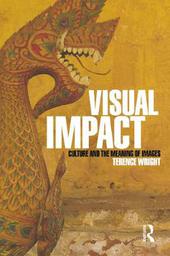
|
Visual Impact: Culture and the Meaning of Images
Paperback / softback
Main Details
| Title |
Visual Impact: Culture and the Meaning of Images
|
| Authors and Contributors |
By (author) Terence Wright
|
| Physical Properties |
| Format:Paperback / softback | | Pages:208 | | Dimensions(mm): Height 234,Width 156 |
|
| Category/Genre | Art History
Photography and photographs
Films and cinema
Internet guides and online services |
|---|
| ISBN/Barcode |
9781859734735
|
| Classifications | Dewey:306 |
|---|
| Audience | | Tertiary Education (US: College) | |
|---|
|
Publishing Details |
| Publisher |
Bloomsbury Publishing PLC
|
| Imprint |
Berg Publishers
|
| Publication Date |
1 December 2008 |
| Publication Country |
United Kingdom
|
Description
From the office to domestic interiors to shops, images surround us in modern life. The internet has increased this visual onslaught exponentially. Is there a systematic order to this seemingly endless array of pictures and depictions? Looking at picture-making traditions around the world, the author demonstrates how schemes of depiction are ordered throughout all ages and across all cultures. Drawing on a wide range of examples - from painting and drawing to film, photography and the web - this book analyzes the theory and practice of visual representation. Pictures and images provide a cognitive context through which people can explore and understand their world. They frame and shape daily life. By considering the techniques and systems that inform visual displays, the author examines how cultural values and traditions shape particular visual styles. Drawing on the growing field of visual anthropology he sets image making in an historical and global context, and uses it as a window for exploring the human condition at a deeper level. Anyone interested in the cultural role of art, film and the internet will find this book an exciting and stimulating read.
Author Biography
Terence Wright is Reader in Theoretical Studies in Visual Art, University of Ulster.
ReviewsWright brings unique experience to his study of image making. What Wright elucidates beautifully is how new digital technology allows nearly universal participation in the production of interactive depictions of culture. - L. De Danaan, CHOICE Magazine
|